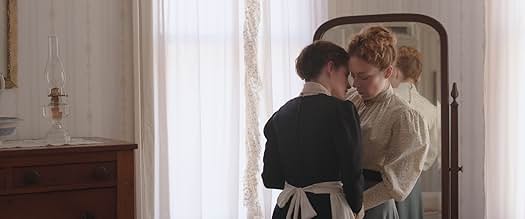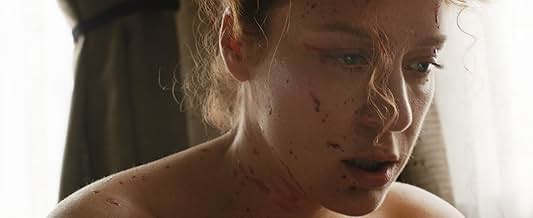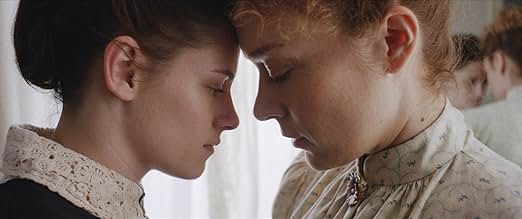NOTE IMDb
5,9/10
9,7 k
MA NOTE
Un thriller psychologique inspiré des infâmes mais célèbres assassinats de la famille Borden en 1892.Un thriller psychologique inspiré des infâmes mais célèbres assassinats de la famille Borden en 1892.Un thriller psychologique inspiré des infâmes mais célèbres assassinats de la famille Borden en 1892.
- Récompenses
- 1 nomination au total
Histoire
Le saviez-vous
- AnecdotesThe photograph in the locket that the fictional Lizzie's father gives her is of the real Lizzie Borden's mother Sarah. She died when Lizzie was a baby.
- GaffesThe end of the film states that Emma and Lizzie had a rift "soon after" the trial and became estranged, but it was actually 12 years later that Emma separated from Lizzie and moved out of their house forever. No one knows for sure what the rift was about, but it's believed by many that Emma discovered Lizzie really was guilty of the murders.
- Citations
Bridget Sullivan: What was I to you? I don't know who you are.
Lizzie Borden: Were you better off before? Is that it?
- Bandes originalesEbben? Ne Andrò Lontana From 'La Wally', Act I
Written by Alfredo Catalani
Performed by Maria Luigia Borsi and the London Symphony Orchestra, conducted by Yves Abel
Courtesy of Naxos
By arrangement with Source/Q
Commentaire à la une
There are certain ideas that every few years get reused for major movie releases. Examining the life of Lizzie Borden happens a bit infrequently compared to other concepts, but the 2018 film 'Lizzie' isn't the first to do so, and surely won't be the last.
The tale of Lizzie Borden is fairly common knowledge at this point: she is alleged to have murdered her parents with an ax, and when put on trial for the crimes, she was acquitted. The finer details of who Lizzie was, and how and why she did it, are the real points of debate and interest, and the things that filmmakers may emphasize or deemphasize as they see fit for the picture they want to make.
'Lizzie' chooses to focus on the build-up to the murders, with little time spent on the trial and a mere few lines of text to describe Borden's life after. What we are shown is how very abusive Lizzie's father Andrew was, in almost every way a father could be. From writing off Lizzie's future to destroying those things she held dear, we're given a poor impression of Mr. Borden - and of his wife, Abby, who Lizzie resents for her inaction.
Lizzie also recognizes her father's abuse of the family's live-in servant, Irish immigrant Bridget Sullivan. In Miss Sullivan this film finds another focus as it spends some time on the developing friendship between Lizzie and Bridget. One can't ignore that 'Lizzie' undoubtedly gets more steamy than other movies about its subject, too, as it imparts an intimate, sexual relationship between Miss Borden and Miss Sullivan.
The film's bent toward salaciousness is also built into the climax when both Lizzie and Bridget take up the ax against the elder Bordens, ensuring in the process that they get no blood on their clothing.
How does the thrust of the narrative here compare to other films about Lizzie Borden? How likely is it to be an accurate depiction of those events in 1892 that we can only speculate on? I leave those questions for Lizzie enthusiasts and historians. How is 'Lizzie' in and of itself?
The number one thing to remark on are the performances. In particular, Chloe Sevigny shines as Lizzie Borden, putting in a performance that is as powerful as it is stoic. As critics have remarked, she is so steady and flatly even in her role as to almost single-handedly give the picture a great air of seriousness. She is joined in a similar manner by Kristen Stewart as Bridget Sullivan. Stewart got a lot of flak for wooden, unmoving acting in the 'Twilight' films, but I rather think that folks forget she's an actress - given the freedom and direction to embody a character as she will, Stewart is very capable. In 'Lizzie' she largely mirrors Sevigny, if anything giving Sullivan a slightly greater emotive range even as she remains resolute, and loyal to her friend and lover.
That dispassion and restraint is built into the production as well, perhaps to a fault. The whole picture feels very understated; Jeff Russo's score is so minimized that one may be forgiven for forgetting that 'Lizzie' had any music at all. To an extent I can appreciate applying such calculated dampening to what is essentially a historical reenactment, but there needs to be some variation in tone, some peaks and valleys. As it stands, even as 'Lizzie' is anchored by Sevigny and Stewart's fine performances, it's also weakened by a lack of vibrancy in even the most dramatic moments.
Hand in hand with the somewhat muted feel of the feature, there's something to be said, too, for how its treatment of the life and times of Lizzie Borden dispenses with any commentary on society at the time. That unmarried Lizzie would see her father write her out of any possible inheritance, thereby severely limiting her means, would certainly be a strong motive for murdering him. Women's rights were far more of a nightmare in the late 19th century than they are even now, with almost no agency or autonomy to speak of. Almost any other movie would acknowledge sociopolitical issues with at least a passing line of dialogue, if not an active interest of a character. 'Lizzie' leaves it to viewers to pick up on these matters by themselves. Which is fine - there's no written rule of film-making that says every last detail has to be spoon-fed to the audience, nor would I want there to be - but it's striking nonetheless.
Between the blood, violence, sexuality, and nudity, it's not going to be for everyone, and discretion is advised as well for viewers with a keen focus on historical accuracy and/or Lizzie's legacy. Yet overall, I think 'Lizzie' is a pretty good movie that effectively conveys the events of 1892 for those unfamiliar. The stony evenness of its tone is off-putting, but Chloe Sevigny and Kristen Stewart's performances alone make it worth watching.
Don't go out of your way to find it, but 'Lizzie' is worthwhile if you come across it.
The tale of Lizzie Borden is fairly common knowledge at this point: she is alleged to have murdered her parents with an ax, and when put on trial for the crimes, she was acquitted. The finer details of who Lizzie was, and how and why she did it, are the real points of debate and interest, and the things that filmmakers may emphasize or deemphasize as they see fit for the picture they want to make.
'Lizzie' chooses to focus on the build-up to the murders, with little time spent on the trial and a mere few lines of text to describe Borden's life after. What we are shown is how very abusive Lizzie's father Andrew was, in almost every way a father could be. From writing off Lizzie's future to destroying those things she held dear, we're given a poor impression of Mr. Borden - and of his wife, Abby, who Lizzie resents for her inaction.
Lizzie also recognizes her father's abuse of the family's live-in servant, Irish immigrant Bridget Sullivan. In Miss Sullivan this film finds another focus as it spends some time on the developing friendship between Lizzie and Bridget. One can't ignore that 'Lizzie' undoubtedly gets more steamy than other movies about its subject, too, as it imparts an intimate, sexual relationship between Miss Borden and Miss Sullivan.
The film's bent toward salaciousness is also built into the climax when both Lizzie and Bridget take up the ax against the elder Bordens, ensuring in the process that they get no blood on their clothing.
How does the thrust of the narrative here compare to other films about Lizzie Borden? How likely is it to be an accurate depiction of those events in 1892 that we can only speculate on? I leave those questions for Lizzie enthusiasts and historians. How is 'Lizzie' in and of itself?
The number one thing to remark on are the performances. In particular, Chloe Sevigny shines as Lizzie Borden, putting in a performance that is as powerful as it is stoic. As critics have remarked, she is so steady and flatly even in her role as to almost single-handedly give the picture a great air of seriousness. She is joined in a similar manner by Kristen Stewart as Bridget Sullivan. Stewart got a lot of flak for wooden, unmoving acting in the 'Twilight' films, but I rather think that folks forget she's an actress - given the freedom and direction to embody a character as she will, Stewart is very capable. In 'Lizzie' she largely mirrors Sevigny, if anything giving Sullivan a slightly greater emotive range even as she remains resolute, and loyal to her friend and lover.
That dispassion and restraint is built into the production as well, perhaps to a fault. The whole picture feels very understated; Jeff Russo's score is so minimized that one may be forgiven for forgetting that 'Lizzie' had any music at all. To an extent I can appreciate applying such calculated dampening to what is essentially a historical reenactment, but there needs to be some variation in tone, some peaks and valleys. As it stands, even as 'Lizzie' is anchored by Sevigny and Stewart's fine performances, it's also weakened by a lack of vibrancy in even the most dramatic moments.
Hand in hand with the somewhat muted feel of the feature, there's something to be said, too, for how its treatment of the life and times of Lizzie Borden dispenses with any commentary on society at the time. That unmarried Lizzie would see her father write her out of any possible inheritance, thereby severely limiting her means, would certainly be a strong motive for murdering him. Women's rights were far more of a nightmare in the late 19th century than they are even now, with almost no agency or autonomy to speak of. Almost any other movie would acknowledge sociopolitical issues with at least a passing line of dialogue, if not an active interest of a character. 'Lizzie' leaves it to viewers to pick up on these matters by themselves. Which is fine - there's no written rule of film-making that says every last detail has to be spoon-fed to the audience, nor would I want there to be - but it's striking nonetheless.
Between the blood, violence, sexuality, and nudity, it's not going to be for everyone, and discretion is advised as well for viewers with a keen focus on historical accuracy and/or Lizzie's legacy. Yet overall, I think 'Lizzie' is a pretty good movie that effectively conveys the events of 1892 for those unfamiliar. The stony evenness of its tone is off-putting, but Chloe Sevigny and Kristen Stewart's performances alone make it worth watching.
Don't go out of your way to find it, but 'Lizzie' is worthwhile if you come across it.
- I_Ailurophile
- 5 mars 2021
- Permalien
Meilleurs choix
Connectez-vous pour évaluer et suivre la liste de favoris afin de recevoir des recommandations personnalisées
- How long is Lizzie?Alimenté par Alexa
Détails
Box-office
- Montant brut aux États-Unis et au Canada
- 642 157 $US
- Week-end de sortie aux États-Unis et au Canada
- 47 580 $US
- 16 sept. 2018
- Montant brut mondial
- 844 786 $US
- Durée1 heure 45 minutes
- Couleur
- Rapport de forme
- 2.39 : 1
Contribuer à cette page
Suggérer une modification ou ajouter du contenu manquant



























